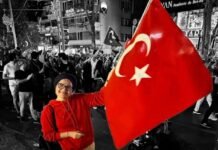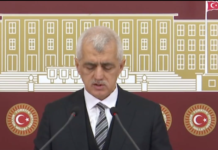The Turkish government’s targeting of a human rights statue in Ankara is a “reflection of the fascism in our country,” Germany’s influential media outlet Deutsche Welle (DW) quoted a previously jailed teacher as saying, reporting on Tuesday that “One year ago, Turkish police erected barriers around a monument in Ankara dedicated to human rights. The statue has become a symbol of the country’s state of emergency — and the erosion of human rights it brings.”
“On one of Ankara’s busiest streets stands a bronze statue of a woman holding a human rights declaration in her hand. Police in the Turkish capital guard the monument around the clock. No one is allowed to approach it, and photos and videos are forbidden. Police say the monument has been barricaded off for security reasons,” the DW report starts out by saying, and adds:
“The statue was erected in 1990 and people of all political convictions have gathered there ever since. It has been a meeting point for protests and a place to address the media. It was a gathering point for Ankara citizens during İstanbul’s 2013 Gezi Park protests, too.
“Things changed after the failed coup on June 15, 2016. Turkey has been under a state of emergency since then, and it was extended for the seventh time in April. Since that failed coup, 228,000 people have been arrested and a further 116,000 dismissed from public service, according to the Turkish Interior Ministry.
“Scientist Nuriye Gülmen and grade school teacher Semih Özakça were among the thousands of people who lost their jobs. They spent months after their sackings sitting beside the Ankara human rights monument, demanding their jobs be reinstated. On May 23, 2017 police cordoned off the bronze figure with a metal barrier and arrested Gülmen and Özakça. …
“Daily protests followed, which the police countered with violent force that was documented on social media. Protesters were detained in the morning and let go in the evening. Ankara’s governor declared the barriers a ‘security measure’ stemming from Turkey’s state of emergency.
“‘As far as I am concerned, the barriers are a reflection of the fascism in our country,’ Gülmen told DW a year after the incident, arguing that the acts of state repression only show the government’s powerlessness. ‘It doesn’t make sense to “detain’ a monument”,’ she said. ‘But the message to the people is clear: “Look, this is a dangerous place!” …
“Turkish sculptor Metin Yurdanur gifted the bronze figure to Ankara’s Çankaya district 28 years ago. Like all of his works, this monument belongs to humankind, he told DW. ‘I want all of my works to find a place in a peaceful world’.”















